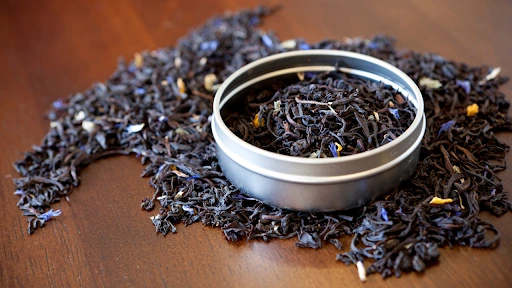Is Earl Grey Tea Good for Digestion? Understanding Its Benefits for Your Stomach
Introduction
Apart from being a pleasant and aromatic beverage, Earl Grey tea could help your digestive system. Earl Grey is a fantastic choice after meals since black tea and bergamot oil combined help digestion in various ways. Earl Grey tea’s digestive advantages will be discussed in this post together with how it might assist with frequent digestive problems like stomach discomfort, indigestion, and bloating.
Black Tea and Digestive Health
Black tea, the foundation of Earl Grey, has long been connected to digestive health. It features naturally occurring antioxidants called polyphenols, which have been well-known These polyphenols lower intestinal inflammation and encourage the growth of beneficial bacteria, therefore supporting effective digestion. Better general gut health follows from this in turn.
Antioxidants and Their Role in Digestion
Earl Grey tea following meals might aid in digestion and help to calm your stomach. Over time, the antioxidants in the tea aid the body to neutralize free radicals, therefore reducing inflammation and digestive problems. Long-term gut health may be improved and several digestive disorders’ risk lowered by consistent black tea drinking.
Bergamot Oil and Its Digestive Benefits
The main component giving Earl Grey tea its distinctive taste, bergamot oil also possesses qualities that can help your digestive system. For generations, traditional medicine has made use of bergamot’s essential oil for its sedative and digestive-improving properties. Studies indicate that by inducing bile, which helps break down lipids and the whole digestion process, bergamot oil can help treat indigestion and bloating.
Bergamot Oil as a Natural Antispasmodic
Natural antispasmodic qualities of bergamot oil also allow it to help your digestive tract’s muscles to relax. If gas or bloating causes you pain, this can be very beneficial. After a big dinner, sipping Earl Grey tea will assist your stomach to feel more relaxed and stop indigestion-related pain.
Earl Grey Tea as a Nausea Remedy
Earl Grey tea’s possible ability to reduce nausea adds still another benefit for digestion. Bergamot oil has been demonstrated to have a relaxing impact that helps to ease nausea and a disturbed stomach. Whether motion sickness, stress, or an upset stomach causes it, drinking Earl Grey tea can naturally help.
Aromatherapy Benefits of Bergamot
Earl Grey tea might have a similar effect since aromatherapy’s bergamot fragrance has been used to relax the digestive tract. When you’re under the weather, the comforting warmth of the tea mixed with the citrusy scent of bergamot will help relax your nerves and reduce any sensations of nausea.
Earl Grey Tea and Acid Reflux Prevention
Earl Grey tea helps prevent acid reflux, a common disorder brought on by stomach acid running back into the esophagus causing heartburn and discomfort. Earl Grey tea is sometimes regarded as a milder substitute even if some other caffeinated beverages like coffee might cause acid reflux. Earl Grey tea has less caffeine than coffee, which can help to lessen the risk of acid reflux developing.
Bergamot Oil’s Role in Soothing Acid Reflux
Furthermore, bergamot oil’s soothing qualities could help to calm the stomach lining and lower acid-building risks. Particularly if you have acid reflux and find yourself uncomfortable after meals, drinking Earl Grey tea can assist in relaxing your digestive tract.
Bile Production and Nutrient Absorption
Daily Benefits of Earl Grey Tea for Digestion
Earl Grey tea can help you have better nutrient absorption and digestion in daily life. This is a mild approach to maintaining your digestive health without depending on strong drugs or therapies.
Best Time to Drink Earl Grey Tea for Digestion
Earl Grey tea’s digestive properties are best enjoyed when drunk either after meals or when you experience digestive problems. Twenty to thirty minutes after dinner, sip a cup of Earl Grey tea to assist your stomach muscles relax, lessen bloating, and soothe any indigestion. Drinking a cup of Earl Grey tea every day might provide continuous relief for those suffering from acid reflux or nausea.
Moderation and Recommended Intake
Earl Grey tea is best used in moderation even if it can help with digestion. Limit yourself to two to three cups daily as too much caffeine could cause dehydration and other problems. If you find caffeine objectionable, think about choosing Earl Grey tea in a decaffeinated form.
Conclusion
Ultimately, Earl Grey tea offers various digestive advantages that can aid with typical problems like bloating, gas, and nausea, thereby transcending mere taste. Black tea and bergamot oil used together provide a natural and calming cure for many stomach disorders. Earl Grey tea can be a great addition to your regimen whether your goals are to unwind following a large meal, ease stomach trouble, or enhance general digestion.
Read also: Foods That Balance Earl Grey Tea’s Taste: Perfect Pairings



